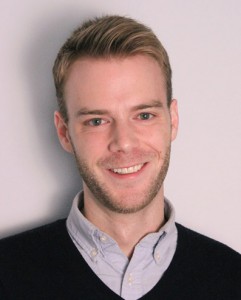Meet the AHA Staff: Peter Bjork

Learn more about the AHA’s new web content manager, Peter Bjork!
HNN: What is your educational and work background?
Peter: My background is a bit winding, but I wouldn’t change a thing: I received an undergraduate degree in communications from Syracuse University, and as part of my liberal arts core I was fortunate enough to take a class on atheism studies. That class is one of a select few that have really stuck with me over the years, and it no doubt contributed to my passion for emboldening secular society.
After college, I moved to Washington, DC and started working in nonprofit communications – first at a firm, then later on at a good-government group. A little over two years ago, my partner and I moved abroad to London, UK so he could pursue a graduate degree. During our two years there I worked in online communications at Syracuse University’s study abroad program in London, and found the experience of working abroad absolutely invigorating. We moved back to DC a few months ago, and now I’m on to the next chapter in my life!
HNN: How did you first learn about humanism or atheism? Do you consider yourself a humanist?
Peter: I was raised – without the actual labels – as a “secular humanist” of sorts. During my childhood I was never forced to adhere to any religion, and over the course of my life I gradually realized that my moral compass isn’t guided by any theistic force. At my philosophic core I consider myself an agnostic-with-atheistic-tendencies rather than a full-on atheist, and I’m attracted most to Kurt Vonnegut’s stance that humanism “means trying to behave decently without expectation of rewards or punishment after you are dead.”
HNN: What was growing up in a non-religious household like?
Peter: I consider myself lucky not to have been raised in any religion, though I’m sure I would have encountered support had I chosen to explore one. Watching my childhood friends oftentimes (though certainly not always) be forced to attend church, I knew that organized religion was not for me.
HNN: What interested you most about working for the AHA?
Peter: I think what most attracted me to the AHA was the huge scope of work that the organization oversees. All under the banner of promoting secular society, we’re able to publish a magazine and books, vigorously wield the law to ensure separation of church and state, organize and foster hundreds of local humanist groups, and contribute our voices to the media. It seemed like an incredibly impressive body of work for such a small staff, and so here I am!
HNN: Have you read any good books lately? What’s your favorite book?
Peter: I’ve just started Dan Simmon’s Hyperion Cantos, and just finished the first of the four books in the series, Hyperion. If you’re open to sci-fi, I really cannot recommend it enough – it features incredibly compelling writing set over a truly epic tale of the fate of humanity. It’s on every sci-fi geek’s must-read list for a very good reason.
Before Hyperion, I read the brilliant satirist Gary Shteyngart’s Super Sad True Love Story, a strikingly prescient, humorous, and at times incredibly sad near-future dystopian novel.
I’ve also long been a fan of noted humanist Kurt Vonnegut, and I’d have to say my favorite Vonnegut book is an ironic choice, considering the title: God Bless You, Mr. Rosewater.
HNN: If you could have dinner with any three people (living or dead), who would they be?
Peter: Though the answer to this question would probably change daily in accordance with my mood, right now I’d love to get dinner with Rachel Maddow, Joan Rivers and Diane Rehm.
